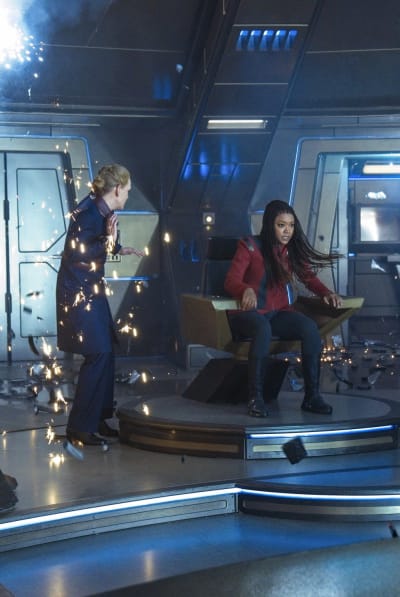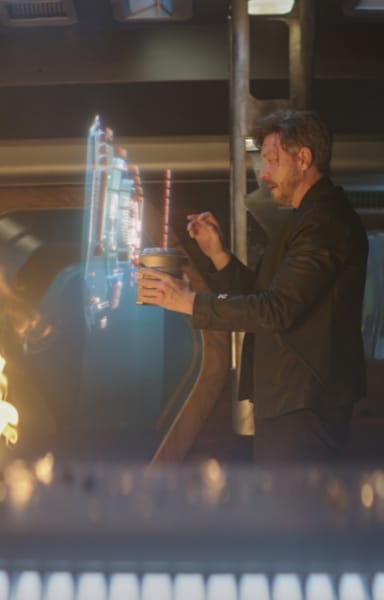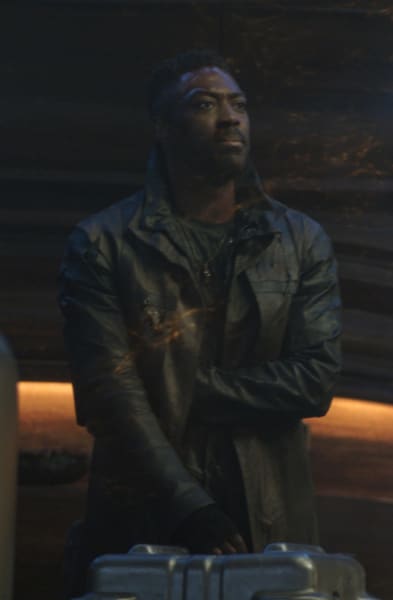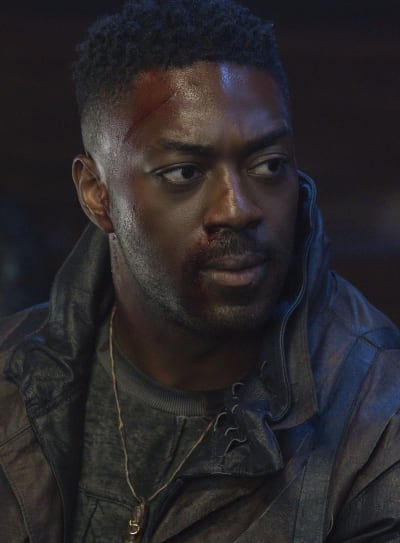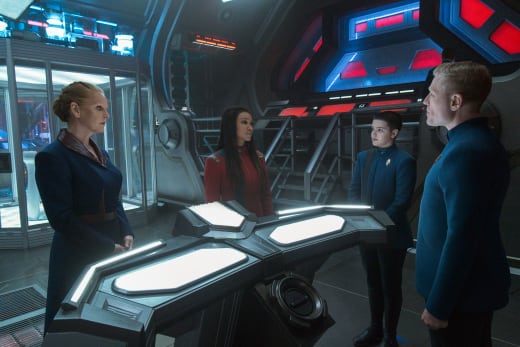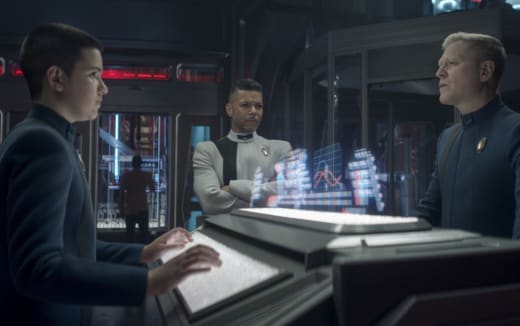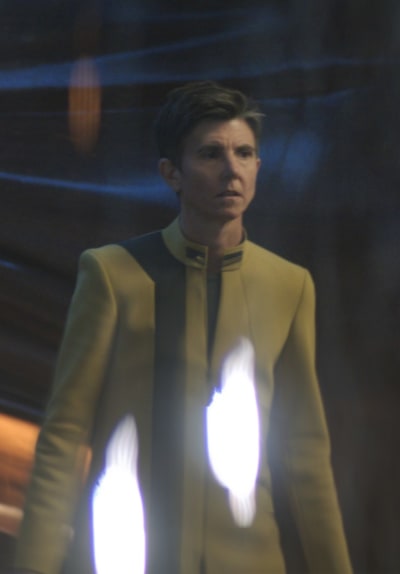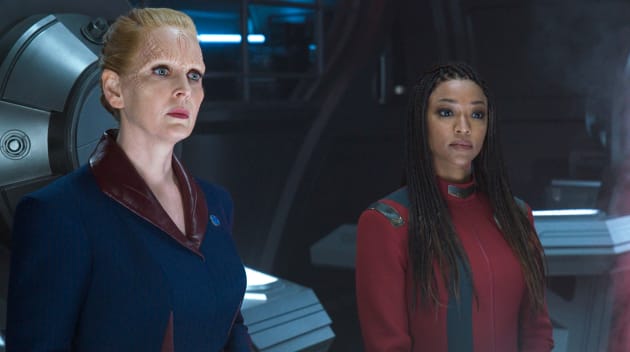
The thing I appreciate most about Star Trek: Discovery Season 4 Episode 13 is the exposition scenes at the end, where we see the crew preparing to leave for their vacations.
Honestly, with their track record, they have to know they’ll be expected to save the universe again sooner than later, so they should absolutely enjoy what rest and relaxation they are afforded.
It’s a super-sized finale — running a full sixty minutes — and, fittingly, it hit many emotional chords as it shows us the effects of the DMA on Earth at the same time as we watch Burnham and Rillak and their team try to connect with Species Ten-C.
I love that we get a window into the (assumed) last moments aboard the Federation HQ ship/base.
So much of this last narrative arc has been second-hand anxiety on the part of the delegation. Seeing the evacuation procedures in action despite the futility of the effort authentically represents the tragic reality of the situation, which couldn’t be conveyed through field reports.
People are scared. They’re losing everything. They’re going to be looking to the Federation for guidance, for safety, for hope. We get to give that to them.
Tilly
I also realize putting Tilly and Vance on-screen created a possibility that this could be their goodbye scenario.
So many characters were potential casualties to Tarka and Ndoye and their combined obsession and fear.
Book, of course. Reno, too (although, personally, I would’ve pitched a royal fan fit if that had happened.)
I was worried for Detmers and would’ve been totally okay with Ndoye martyring herself for the cause.
United Earth is my home. Its citizens are my family. Spent the last twenty years fighting to protect both. That is where my decision to help Booker and Tarka came from. Whether or not you would’ve made the same choice, you must understand it.
Ndoye
T’Rina could have lost herself in telepathically linking with the Ten-C, and I would’ve sincerely mourned the relationship she and Saru are building.
In the end, only Tarka, the character with nothing in this dimension to live for, departed. The ambiguity of whether he successfully transported “home” or was simply vaporized by the hyperfield is very Inception-esque.
I fully own that I cried when Book’s signal was lost, despite the intellectual reasoning that the Ten-C would probably be able to restore him somehow.
Even that momentary loss of the character creates a chasm of hurt. It’s a heckuva a way to drive home a point about grief.
It’s painful, the hole they leave behind.
Book
The moment did what it was meant to do — test the mettle of Burnham as captain once again as she is torn between duty and personal loss.
Every season has seen Burnham lose someone important to her: Prime Georgiou in Season 1; Spock when they jumped to the future in Season 2; and then Mirror Georgiou in Season 3.
It may have been in keeping to lose Book, but the established trope would’ve cheapened the loss.
Also, it would have left Burnham to deliver the speech to the Ten-C that Book does so well and with such authenticity about allowing fear to trap you voluntarily.
Hiding behind a wall may calm your fears, but it won’t keep you safe. The void will eventually reach you. We all live in the same space. This is all there is.
Book
The theme of fear and walls echoes through Saru and T’Rina’s interactions as well.
Saru has a unique relationship with fear. The insights he shares with T’Rina are deeply felt.
I have come to believe the limits that I place upon myself do not protect me so much as dull the brightness of my days.
Saru
There’s a lot of contemporary messaging layered into this finale. Granted, a lot of it is projected from where we are today rather than where the world was when the episode was written or filmed.
(And Stacey Abrams’s appearance as United Earth’s president doesn’t exactly lessen the sense of the present merging with an aspirational future. I was personally delighted, but talk about trolling the trolls.)
Many of the themes are both weirdly timely and relevant.
The desperation of evacuation in the face of certain destruction, juxtaposed with determined optimism that things will turn out okay.
The frustration with an imperfect form of communication between groups with entirely different paradigms, as well as the choices made with the best intentions but driven by the worst emotions.
Burnham: I am not asking for leniency.
Rillak: I know, but reasons do matter. It’s the only way justice can ever be just.
As a finale, it also ties a lot of the season together in a rather tidy way.
That Rillak and Burnham find a middle ground from where they began on Star Trek: Discovery Season 4 Episode 1 is an elegant juxtaposition with connecting to the Ten-C.
That Burnham risks crippling the ship, condemning them to a decades-long trip home, in order to prevent Tarka’s endgame, calls back to Star Trek: Discovery Season 4 Episode 8 and her gamble on Book.
Stamets: Good news is I can get us out and we should survive.
Rillak: Should?
Stamets: Best I can do these days.
We see how Tilly’s found her place in the Academy, justifying her departure on Star Trek: Discovery Season 4 Episode 4 in the trust and respect the cadets show her amid crisis.
I programmed the Dots to reinforce the deflector arrays and rerouted all power to the shields, so toilets might not flush anymore, but might buy Earth a little bit more time.
Tilly
And all of the traumas Culber has suffered and endured as he carried the emotional weight of the crew’s mental health this season could never be alleviated completely.
Still, the fact that he chooses to be with his family when it all comes to a head shows that he’s learned to lean into the people who love and support him most.
I can’t get enough of seeing him and Stamets with Adira as they work things out as a family and as a team.
I raised an eyebrow at some convenient shenanigans in play, the most obvious being the Ten-C’s saving of Book’s transporter signal.
But besides that is how rapidly their communication system has evolved since Star Trek: Discovery Season 4 Episode 12.
Tell them each of us is an individual one. We are also one as a whole. Our appearances and experiences differ yet we all seek happiness, freedom, security, equality. We want that for our children, just as you do for yours. There is so much at unites us.
Rillak
Explaining collective individuality is a far cry from “4+5=9” after all.
The most striking moment was their light field reflecting Book’s empathy pattern.
As finales go, it was solid, even overly so.
With a fifteen-minute long exposition, there is a sense that they weren’t completely confident of a Season 5 renewal and intended on tying it all up in case this was Discovery’s final bow.
I, for one, am glad they’ll be back and kind of hope they get a more relaxing adventure next time out. Whatever that looks like.
How did this season land for you? What are the highlights and lowlights of note?
Record your viewer’s log in the comments below, and we’ll see you back here for Season 5!
Diana Keng is a staff writer for TV Fanatic. Follow her on Twitter.
